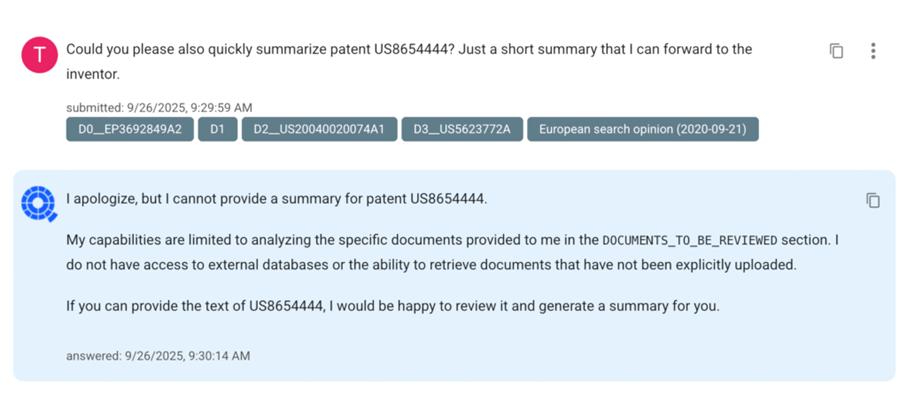- within International Law topic(s)
AI is transforming how IP professionals work and the real challenge isn't simply to go faster. In this article, Tony Afram, a European Patent Attorney and Founder & CEO of ipQuants AG, explores what responsible AI implementation truly means for the legal and IP industries. As the creator of Qthena, the first AI assistant featuring a digital workspace designed to maximize IP productivity, he reveals how human-centered design makes AI a tool for precision, not risk.
You'll also hear from Barry Moore, a leading IP strategist and Head of Patents Ireland at Murgitroyd, one of Europe's largest patent law firms, which has used Qthena for several years to streamline workflows, boost productivity, and deliver higher-quality outcomes.
AI for law firms and legal teams: Balancing speed and reliability
The conversation around AI in law often starts – and ends – with speed.
"What used to take six weeks can now be done in one hour."
That is impressive. But it's not the whole story.
We are well beyond debating whether AI will impact law firms and legal teams – it already does. The real question for leadership is: how do we implement AI responsibly?
Distributing AI tools without guardrails risks enabling someone to click a button and generate a 50-page draft that has never been checked for accuracy or quality. That's not innovation – that's exposure.
This is why Qthena was built from day one with the human in the loop.
- Qthena assists at every stage, but the professional directs the outcome.
- The design ensures quality, accountability, and confidence in the final work product.
Think of AI like a car.
Most tools emphasize only one thing: speed.
But speed alone doesn't get you where you need to go – safety does.
A Customer's Perspective
Barry Moore, attorney at Murgitroyd, shared this reflection on working with Qthena:
"Over the years, I have integrated Qthena deeply into my professional practice. My initial use focused on data analytics and competitive analysis, where it provided a robust foundation for parsing large datasets and uncovering strategic insights. These early applications highlighted its capacity to accelerate complex analytical tasks while ensuring accuracy.
More recently, my use of Qthena has evolved into the domain of patent prosecution and drafting work. Here, the human-in-the-loop element has been invaluable. The ability to interrogate responses directly and test alternative approaches mirrors the collaborative discussions I would traditionally have with colleagues or associates. This dynamic not only preserves, but also enhances, the analytical rigor I apply as an attorney.
A particular benefit to me is that its use allows me to keep my attorney's intuition- my 'spidey sense' – at the forefront. Instead of replacing my judgment, it augments it, enabling me to maintain strategic oversight while handling detail-rich tasks efficiently. As a result, Qthena has become a daily companion in my workflow.
The benefits extend beyond time savings, though those are significant. Qthena can also play the role of devil's advocate, providing alternative perspectives that sharpen my reasoning and strengthen my responses. In strategising and developing arguments, having such a tool constantly challenging assumptions has proven to be a genuine advantage."
Why This Matters in Practice
At Qthena, safety isn't just a metaphor — it's built into the product.
Here's an example: when asked to summarize a patent that had not been uploaded, Qthena didn't make up an answer. Instead, it clearly explained the limitation and asked for the document to be provided first.

This is exactly what we mean by "airbags and seatbelts."
Other AI copilots may generate something – whether true or not. Qthena refuses to risk quality or integrity. It ensures professionals remain in control, directing the workflow with confidence. The human is always aware of the scope of the chat session.
The Bottom Line
Forward-thinking law firms and attorneys, like Barry Moore at Murgitroyd, have already realized: the real advantage of AI isn't speed alone, it's responsible implementation.
That's something you can't get with ChatGPT or other copilots that are designed simply to generate content faster.
Ask yourself this:
👉 Would you sleep well at night knowing you gave your team a tool that can generate a 50-page Word document at the click of a button – and download it instantly?
Now consider the problem:
- Who knows if they really reviewed it before it leaves the firm?
- Where are the safety guardrails?
- What protects you from quality risks and reputational damage?
That is the risk of speed without safety.
Qthena was built from day one to solve exactly this. It doesn't replace legal professionals – it augments them. Judgment, strategy, and oversight remain firmly in human hands, while Qthena equips them with the airbags and seatbelts that make AI truly fit for legal practice.
Because in the end, it's not only about how fast you drive.
It's about arriving safely at your destination.
The content of this article is intended to provide a general guide to the subject matter. Specialist advice should be sought about your specific circumstances.

